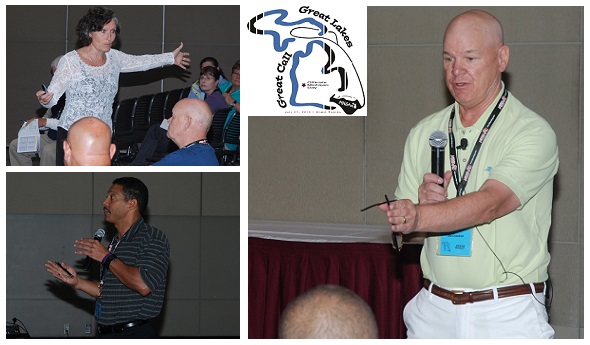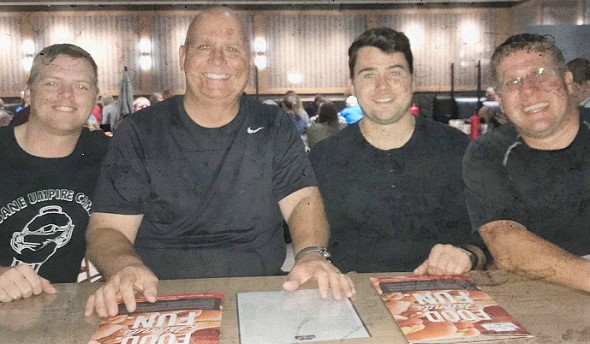
'Officiate Michigan Day' Welcomes 1,200
July 27, 2013
By Geoff Kimmerly
Second Half editor
GRAND RAPIDS – April Martin aspires to move up the college basketball officiating ladder. Receiving an NCAA Tournament assignment someday is a dream.
So she spent the first half of Saturday's "Officiate Michigan Day" at DeVos Place in Grand Rapids receiving tips and learning what it takes to get to the top from two of the most respected referees in her field -- NBA Finals veterans Joe Crawford and Bill Kennedy.
Crawford and Kennedy were two of more than 40 officials representing the professional, college and high school levels who passed on their expertise to Martin and a total of 1,248 officials who attended Saturday's event, believed to be one of the largest gatherings of sports officials in U.S. history.
Officiate Michigan Day was a cooperative effort by the National Association of Sports Officials and Michigan High School Athletic Association in advance of the NASO annual summit, which kicks off Sunday in Grand Rapids.
"It's just a great day to be a Michigan official," said Martin, a 1997 Detroit Renaissance grad who currently officiates at the high school, junior college, NAIA and NCAA Division III levels. "Seeing your family, which is referees, … it was great seeing everyone here just knowing that everyone is trying to get something out of this day."
Officials from all corners of both peninsulas received the opportunity to learn and interact on a variety of topics and with a variety of officials regarded at the top of their respective fields in Michigan and in some cases nationally.
Sport-specific sessions provided training for officials working in baseball, basketball, competitive cheer, football, gymnastics, lacrosse, ice hockey, soccer, softball, track & field, volleyball and wrestling. Joining Crawford and Kennedy among the best-known instructors and speakers were NCAA National Coordinator of Volleyball Officials Joan Powell, National Hockey League Senior Vice President and Director of Officiating Terry Gregson and official Dan O’Halloran, and National Football League officials Perry Paganelli, Carl Paganelli, Jr., and Dino Paganelli.
 All three Paganellis have officiated Super Bowls, and O’Halloran is coming off working his fourth straight Stanley Cup Final. Crawford and Kennedy both officiated during the recent NBA Finals, and Powell also served as team leader of the U.S. women’s national volleyball team that won the silver medal at the 2008 Olympics.
All three Paganellis have officiated Super Bowls, and O’Halloran is coming off working his fourth straight Stanley Cup Final. Crawford and Kennedy both officiated during the recent NBA Finals, and Powell also served as team leader of the U.S. women’s national volleyball team that won the silver medal at the 2008 Olympics.
MHSAA Executive Director John E. “Jack” Roberts and Barry Mano, founder and president of NASO, gave the opening address to a packed DeVos Center ballroom. Four-time Super Bowl official Jerry Markbreit addressed the entire group to close the afternoon.
"I hope you appreciate what you got here today," said Bill Topp, a presenter Saturday and vice president of publishing and management services for NASO and Referee magazine. "It's not just about the volume of people. It's the types of people you have here and the interaction that's going on and the fact that you've got sports talking to each other where they normally don't talk."
Martin learned but also taught. She sat on the "Officiating 101" panel that discussed issues for new officials, one of 13 lunchtime workshops on topics ranging from life in the NBA to female officials recruitment to outside views on high school officiating.
Marquette's Mark Petrie was one of a small group of officials who made the trip from the Upper Peninsula, and he spent his lunch hour listening to a round table discussion on "Making Good Associations Great." An MHSAA official since 1993, he's the trainer for volleyball for the Upper Peninsula Officials Association.
"It's an opportunity to get together with fellow officials, but more importantly an opportunity to learn and grow as an official," Petrie said. "The day any of us thinks we know everything is the day we should retire."
Commonality was a theme throughout the inaugural Michigan day, with presenters sharing mechanics and strategies that apply at every level of athletics. Equally emphasized was the responsibility of officials to take what they learned back to their local colleagues while working to recruit new officials to the ranks.
"This is pretty unique in that we have this many officials, both men and women, coming together in one place. We have a common theme to improve officiating and to make it consistent at the high school level," said DeWitt's Mike Brya, a high school official since 1995.
"I want to first off be a better official, but also to help our association. To help our officials, help our younger officials, and try to give back as much as I can.
NASO reported on its website that only Georgia's officiating day in 2011, with 1,600 participants, has outdrawn Michigan for a similar event.
PHOTOS: (Top) Clockwise from top left, Joan Powell, Joe Crawford and Bill Kennedy were among speakers at Saturday’s “Officiate Michigan Day.” (Middle) Cheer officials Candy Cox (left) and Stacy Smith present during a breakout session. Click to see more photos from Saturday's event.

The Official View: Night with the Crew
By
Brent Rice
MHSAA Assistant Director
October 1, 2018
By Brent Rice
MHSAA Assistant Director
In this week’s edition we discuss the power of our words and delivering them proactively, examine a football rule regarding rushing the punter and take a look at an “It’s Your Call” at the volleyball net.
It’s Official!
The Words We Use: Officials face criticisms regularly for their rule enforcement, judgment decisions and even positioning. As we know, these criticisms will be tossed about whether you get plays and rulings correct or not, so there is very little we can control in this area. One area we can control the criticisms we receive is the way we speak to others.
I’ve heard people say, “I’ll give them respect when they earn it.” If that’s your line of thinking, maybe you should consider giving respect simply because it’s the right thing to do. The way you communicate as an official to coaches, players and administrators reflects on you professionally, and often is a determining factor on how these parties view you in carrying out the rest of your responsibilities. If they think you’re a bad person, they often don’t give you the benefit of the doubt in close-call situations.
There are a number of books written on the art of diffusing situations through the words you use. One that immediately comes to mind is “Verbal Judo” by George Thompson. It is rather succinct and definitely worth the read. It provides much more detail on the philosophy of word usage, but let me provide you with a couple of seemingly innocuous phrases that can draw the ire of a coach and should be avoided:
“Well, that’s the rule” – Rules citation is very important when providing explanations, but simply stating that the rule says so sounds flippant and is looked at as a cop-out. Instead, start with “By rule,” then use rulebook terminology to describe the situation and ruling.
“Calm down” – While this is much better than the cringe worthy “Shut up” or “Hush” we hear being used from time to time, it still can provoke a primal urge to respond and can actually have the opposite effect of what is intended. Instead, try getting the results you desire by having them talk it through. Try statements like “All right, I’m listening to you,” or “Okay, explain to me what you’re asking.” And when using a phrase like “calm down,” trying adding an “if” statement along with it. For instance, “I’ll explain to you what I have if you calm down.”
Rule of the Week
FOOTBALL Team R loads up the box with rushers to put pressure on K’s punt deep in its own zone. As K1 punts, R1, coming from the center of the line, just gets fingers on the ball and partially blocks it. R2, from the edge, then firmly contacts the kicker’s plant leg and sends him to the ground.
Ruling: This is not a foul (in itself). The rulebook does not provide that only the player who touches the kick is excused from contacting the kicker. This exception to the rule refers only to when “the defense touches the kick.” (9-4-5-b) Of course, this does not give carte blanche to defensive players to go out of their way to unnecessarily rough the kicker just because the ball is touched.
It’s Your Call
VOLLEYBALL The clip from this week picks up after an extended volley. As Team S plays the ball over the net for its third hit, a front row member of Team R makes a play on the ball. The questions is, are the two contacts by the front row R player legal? Why or why not?
Last Week’s IYC Ruling: The basic spot on the play is the end of the run. Using the all-but-one principle, this foul would be penalized from the spot of the foul (A’s 35). If the defense accepts the penalty, it would be A’s ball, 3rd-and-27 on A’s 20. If the defense declines, it would be 4th-and-8 on A’s 39. This is definitely an instance that you want to run the options by B’s coach before enforcing the penalty. (Click to see the video from last week.)
Official View
After a long, hard-fought Friday night contest between Rockford and Greenville, crew members (left to right) Dale Feutz, Brian Donovan, Sam Boland, and Luke Griemsman stop in at a local Rockford eatery to discuss the night’s game over a meal.

